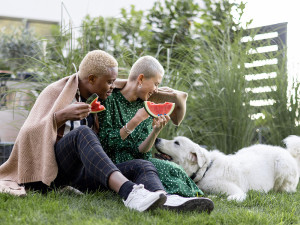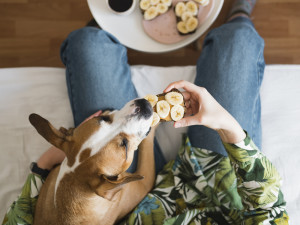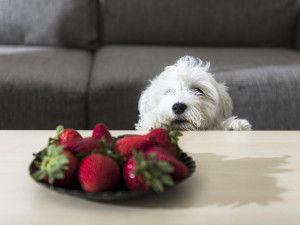Can Dogs Eat Popsicles?
It’s already hot out there, after all.

Share Article
On a hot day (and those have definitely already arrived this summer), there’s nothing like an icy, sweet popsicle to cool you off, and you may be wondering if the same is true for your pup. While many popsicles are safe and nontoxic for dogs, no, popsicles meant for humans are not healthy for dogs.
But there’s good news! There are some creative ways you can make a dog-friendly popsicle. Read on to learn more about popsicles for dogs.
Nutrition facts about popsicles for dogs
Popsicles are delicious, no doubt about it, but they aren’t considered healthy, unless you’re into a kale-based frozen treat or something like that. Most popsicles are delicious because they have lots of added sugars, in the form of high fructose corn syrup and/or traditional added sugar. They also frequently contain fruit flavoring, which may come from whole fruits, fruit juices, or artificial flavors.
Many also contain added ingredients like preservatives and stabilizers including citric acid, guar gum and/or food dye. Some popsicles may be dairy-based or soy-based to provide additional flavor and/or texture too. And while they are not necessarily health food, popsicles have some benefits if they are part of a balanced diet and only shared in small amounts.

Are popsicles good for dogs?
Popsicles are not good for dogs, because they often contain ingredients that would be considered unhealthy for them and lack most of the nutrients that are necessary for dogs. Some benefits that come from popsicles include:
Water: Because popsicles are mostly water, they can be hydrating. For dogs who need to drink more water due to a health problem, or on a hot day, finding creative ways to keep them hydrated is crucial. If you are thinking of using popsicles for this purpose, try to find options that are lower in sugar and do not contain any ingredients that could make them sick. Or you can consider making your own.
Cooling: If your dog has to be outside in the heat, it’s very important to do everything you can to keep them cool. This is especially important for dogs who are very young puppies, elderly, or have underlying health problems including smushed face breeds and dogs with respiratory problems. Ideally, you only take them outside for short periods of time during the coolest parts of the day. Using cool snacks or frozen treats can also help to keep them cool.
Can dogs eat other frozen treats?
This is very dependent on the ingredients in a particular treat. In general, foods that are high in sugar, fat, or dairy are not good for dogs and should be avoided. This means many frozen treats intended for us may not be good choices for them. There are some frozen treats designed specifically for dogs, and while these are safer, because they contain only dog-friendly ingredients, they may be high in fat and sugar, too.
Dogs with certain underlying health problems may not be able to have these so double-check with your vet if you know your dog has certain dietary restrictions. They may be OK for an occasional treat but it is important to keep in mind that these treats add a lot of excess calories to their diet, and if that becomes part of their routine, they may be at risk for weight gain and related health problems, such as diabetes and/or arthritis.
Are popsicles completely safe for dogs?
Popsicles are not completely safe for dogs; they may contain ingredients that are unhealthy or unsafe for dogs to eat. This includes:
High-sugar content: Most popsicles intended for us are high in sugar. These simple sugars contribute excess calories to the diet and put dogs at risk for weight gain and related health problems.
Potentially toxic ingredients: Some flavors of popsicles may contain ingredients that are not safe for dogs. This includes chocolateopens in new tab, grapes, xylitol, and/or dairy-based popsicles. It is safest to completely avoid sharing any foods with your pup that may be toxic or unhealthy.
Watch out for the stick: Even if you elect not to share your popsicle, be sure to keep the stick out your dog’s reach, too. Often, inedible objects that smell and/or taste like food, such as a popsicle stick, will be very appealing to dogs. If they chew on the stick, it could splinter and cause injuries to their mouth or throat and become a choking hazard. If they swallow large pieces of the stick it could also cause an intestinal blockage, requiring surgical removal.
The bottom line: Can dogs eat human food?
There are many human foods that dogs can eat. Because dogs are considered omnivores like us, there is a lot of overlap in the foods that are considered safe and healthy for both humans and dogs. At the same time, it is important to remember that dogs have their own unique needs and in order for them to meet all of their nutritional requirements, they need to eat a complete and balanced dog food diet.
If they are snacking on too many table scraps or treats, they might miss out on important nutrients, leading to deficiencies that can make them sick. Or, they may overeat if they are eating both their dog food and lots of snacks, putting them at risk for weight gain.
As a general rule, treats and table scraps should make up no more than 10 percent of your dog’s total diet, allowing the majority of their diet to come from dog food. You can use those occasional treats and table scraps strategically to provide motivation to your dog during training sessions, as well for mental enrichment.
Frozen treats can be a great way to keep your pup busy and cool since it takes a long time for them to eat. You can try freezing low-sodium broth, low-fat yogurt, or even peanut butter inside their favorite toys, or in a freezer-safe bowl to make a long lasting dog-friendly popsicle. Just be sure to offer it somewhere where you won’t mind the mess as it melts and leaves a trail of popsicle slime.
Other foods that are safe for dogs
Apples are healthyopens in new tab in moderation and have that juicy irresistible crunch.
Bone broth made just for dogs opens in new tabwith only safe ingredients can also be a healthy snack.
Plain cooked shrimpopens in new tab can also be used for an occasional treat.
Other foods that are dangerous
Garlic and other plants in the Allium family are all considered toxic to dogs.
Cheese can also be riskyopens in new tab due to the high fat and high dairy content.
Corn cobs are a definite no-noopens in new tab due to risks of choking and intestinal blockage.
FAQs (People also ask):
How many popsicles can a dog eat?
Dogs should not eat more than the occasional lick of a popsicle if it is high in sugar or other unhealthy ingredients.
Is it OK to give dogs popsicles?
Popsicles intended for humans are often high in sugar and are not healthy for dogs.
Why do dogs like popsicles?
Dogs may like the cool sensation or flavors of a popsicle.
Can dogs eat popsicles?
Many popsicles are non-toxic to dogs but can be unhealthy in large amounts.
References:
ASPCA Poison Control: People Foods to Avoid Feeding Your Pet opens in new tab
Cornell Canine Health Center: Heatstroke: A Medical Emergencyopens in new tab
Journal of Nutrition: The Growing Problem of Obesity in Dogs and Catsopens in new tab

Dr. Amy Fox, DVM
Amy Fox, DVM is a small animal veterinarian in New York City with over thirteen years of experience in a mixture of general practice, emergency medicine, and shelter medicine. A lifelong animal lover, Dr. Fox studied biology in college and then worked as a veterinary nurse before pursuing veterinary school at Cornell University. Her expertise includes surgery, dentistry, and management of chronic conditions, and she is interested in toxicology, pain management, nutrition, care of senior pets, and educational outreach. Dr. Fox also enjoys writing about veterinary medicine and teaching, and her work has previously appeared in Spruce Pets. In her free time, she loves to cook, garden, go for long runs, and hang out with her goofy mixed-breed dog May, who provides never ending comic relief!
Related articles
![Woman holding basket of cherries next to large brown dog.]()
Can Dogs Eat Cherries?
Find out if the yummy fruit is safe to share.
Can Dogs Eat Pears?
It can be a fruit with an acquired taste, but can your pup... acquire it?
Can Dogs Eat Mango?
The delicious fruit is safe in moderation.
Can Your Dog Eat Watermelon?
Yep, you can share watermelon with your pup — but there are a few safety tips to keep in mind.
Can My Dog Eat Bananas?
Yep — bananas are a healthy and delicious treat for your pup.
Can Dogs Eat Strawberries?
In moderation, strawberries are a tasty, healthy treat for your pup.










